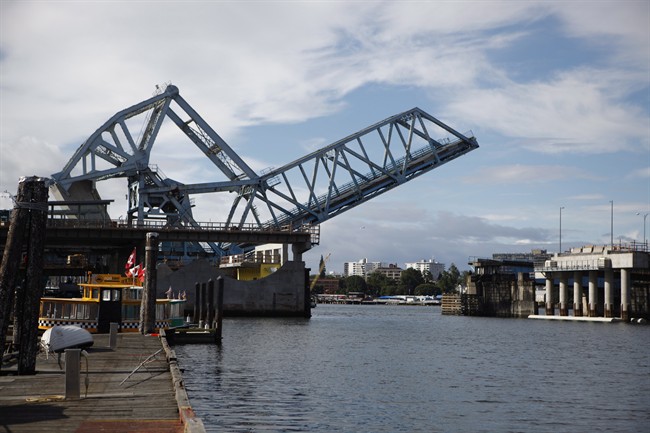VICTORIA – It’s less than 100 metres long, but costs and delays have ballooned for Victoria’s Johnson Street Bridge replacement project in a cautionary tale involving standards for steel and a cultural divide that spans continents.

Known locally as the Blue Bridge for its light blue paint job, the new bridge was originally scheduled to open to traffic last September. It’s now set for completion late next year, about 2 1/2 years behind schedule.
The total cost of the project, including public plazas, erecting the new bridge and taking down the old one, was originally forecast at about $97 million in 2009. It’s currently at $105 million.
Victoria Mayor Lisa Helps said it’s been an expensive lesson for the city, which was promised huge savings by going overseas for the bridge’s steel, but not everything was considered.
“No one told the council or gave council the advice, ‘Oh, you are going to be hiring a contractor that’s going to construct a bridge in China,'” she said. “Well, what are the risks of that? We don’t know the culture. They have different standards. None of that was quantified.”
Almost two years ago, inspectors for the contractor hired by the city to build the bridge “found that some aspects of the steel fabrication had been undertaken outside of the design specifications, so the fabrication of the steel was paused,” says the city’s official website on the bridge.
Inspectors found cracked welds on the proposed bridge deck, and discovered the structure’s trusses and rings did not fit the bridge design, said engineer Jonathan Huggett, who was hired by the city to put the project back on track.

Get breaking National news
Work was stopped and didn’t resume until new steel was ordered and a quality-control inspection team from the city, contractor and Chinese steel company were sent to the fabrication plant to oversee the work.
- Tumbler Ridge B.C. school shooting: 10 dead including shooter, 27 injured
- Deaths of Prince Rupert family ruled homicide-suicide, inquest finds
- Trial starts for man charged in connection with fatal stabbing outside Vancouver Starbucks
- More than 100 B.C. First Nations urge Eby to uphold DRIPA or risk backslide
The bridge crosses Victoria’s downtown harbour and connects the city with its suburban communities, with about 30,000 crossings daily. It rises and falls to allow shipping traffic access to the industrial waterfront.
Helps, who opposed the project as a councillor, said council approved the project based on an incomplete design and a four-per-cent contingency fund to cover cost overruns.
Edmonton-based PCL Constructors Westcoast Ltd., Canada’s largest construction company, was awarded the project with a $62.9 million bid. PCL hired the Jiangsu Zhongtai Bridge Steel Structure Co. Ltd. in China to fabricate the bridge’s steel.
PCL spokesman Shane Jones referred any questions on the project back to the city. The city said comments made by Huggett reflect its position on the project.
READ MORE: Victoria balks at paying more cost overruns on Johnson Street Bridge
In March 2014, PCL asked the city for an extra $9.5 million and an almost six-month extension due to the city delay and design issues.
“To a large extent, both arise out of the difficulties that the city’s consultants have experienced in finalizing a bridge design that is consistent with the scope of work set out in the contract,” said construction manager Don Leachman in a letter to the city.
The Jiangsu Zhongtai Bridge Steel Structure Co. Ltd., could not be reached for comment but its website says it has experience fabricating steel for large-scale bridge steel structures, ship blocks, crane steel work, as well as heavy steel sections for power plants.
Today, the bridge construction site is virtually empty as the city awaits delivery of new steel, due later this year. Traffic continues to move across the old bridge, but commuters need only to look over their shoulders to view the concrete pillars that stand ready for the new bridge.
Huggett said inspectors from the city and contractor are in China examining every weld in an effort to ensure the steel meets its standards and the bridge will be ready by next year.
Huggett, who worked on B.C.’s original SkyTrain transit project in the late 1980s, said going to China for steel has posed language, distance and cultural issues.
“If you’re a steel fabricator in (Canada) and I walk up to you and say, ‘You’ve got a problem in your steel,’ you’d probably say, ‘OK, I’ll go down and fix it,'” said Huggett. “In Asia, if I would walk in and say, ‘You’ve got a problem with your steel,’ that’s an insult. I’m implying that you don’t know what you’re doing.”
The Chinese can make steel that’s up to North American standards, but they are not used to the rigidity of the standards expected for projects like the Johnson Street Bridge, he said.
But Canadian Ironworkers Union spokesman Eric Bohne said cheaper is not always better for major projects especially when it costs Canadian jobs and products.
“This project is screaming that in future we’ve got to start demanding more transparency from our elected officials on all infrastructure projects,” he said.
Huggett said the project is one of the most challenging of his career, with its unique ring and roller system that allows the bridge deck to rise and fall.
“I’m making a Swiss watch,” he said.







Comments
Want to discuss? Please read our Commenting Policy first.